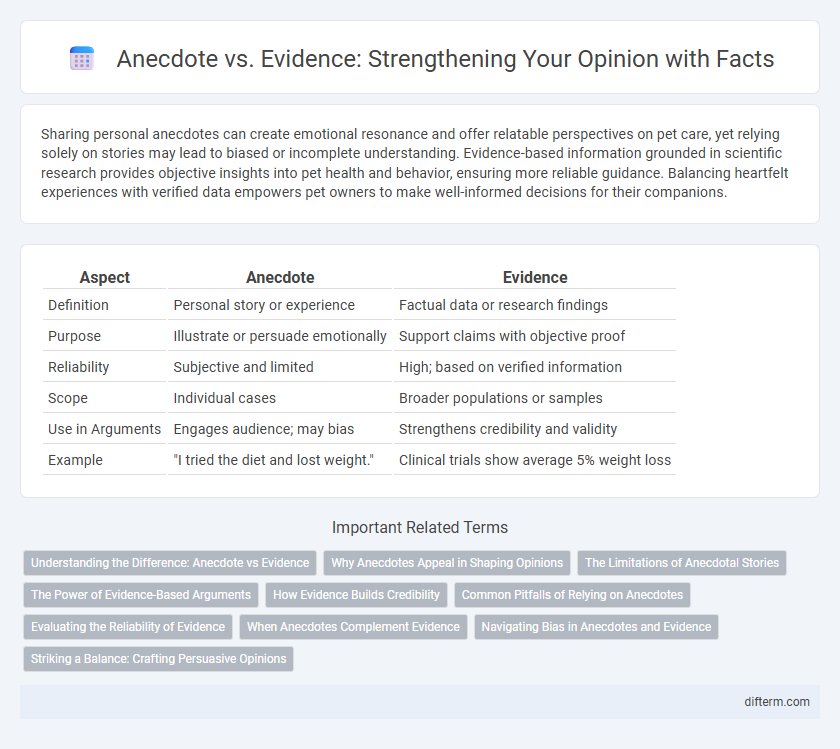Sharing personal anecdotes can create emotional resonance and offer relatable perspectives on pet care, yet relying solely on stories may lead to biased or incomplete understanding. Evidence-based information grounded in scientific research provides objective insights into pet health and behavior, ensuring more reliable guidance. Balancing heartfelt experiences with verified data empowers pet owners to make well-informed decisions for their companions.
Table of Comparison
| Aspect | Anecdote | Evidence |
|---|---|---|
| Definition | Personal story or experience | Factual data or research findings |
| Purpose | Illustrate or persuade emotionally | Support claims with objective proof |
| Reliability | Subjective and limited | High; based on verified information |
| Scope | Individual cases | Broader populations or samples |
| Use in Arguments | Engages audience; may bias | Strengthens credibility and validity |
| Example | "I tried the diet and lost weight." | Clinical trials show average 5% weight loss |
Understanding the Difference: Anecdote vs Evidence
Anecdotes provide personal stories that illustrate individual experiences but lack the systematic rigor of evidence, which is based on verified data and reproducible results. Understanding the difference between anecdote and evidence is crucial for making informed decisions, as evidence supports generalizable conclusions while anecdotes may be biased or unrepresentative. Reliable evidence comes from well-designed studies, statistical analyses, and peer review, ensuring that claims are substantiated beyond isolated incidents.
Why Anecdotes Appeal in Shaping Opinions
Anecdotes appeal in shaping opinions because they provide relatable, memorable stories that evoke emotional responses, making abstract or complex information more accessible. They leverage personal experience to create a sense of trust and authenticity, often bypassing critical scrutiny applied to statistical evidence. This emotional connection can powerfully influence beliefs and decision-making, despite lacking the rigor of empirical data.
The Limitations of Anecdotal Stories
Anecdotal stories often lack the rigor and replicability essential for reliable conclusions, as they are subjective and prone to bias. Unlike empirical evidence, anecdotes cannot establish causation or generalize findings across populations due to their isolated and situational nature. Relying solely on personal stories ignores statistical significance and undermines the scientific method necessary for robust understanding.
The Power of Evidence-Based Arguments
Evidence-based arguments leverage verifiable data and credible sources to strengthen claims, creating a more persuasive and trustworthy narrative than mere anecdotes. Unlike anecdotal evidence, which is often subjective and limited in scope, empirical evidence provides generalizable insights that withstand critical scrutiny. This reliance on well-founded proof enhances decision-making processes and fosters informed discussions across diverse fields.
How Evidence Builds Credibility
Evidence builds credibility by providing factual, verifiable information that supports claims, distinguishing reliable argumentation from mere anecdotal assertions. Unlike anecdotes, which rely on personal stories or isolated examples, evidence encompasses data, statistics, and documented research that collectively reinforce the validity of a position. Incorporating robust evidence not only strengthens persuasive impact but also establishes trust and authority in the presented narrative.
Common Pitfalls of Relying on Anecdotes
Relying on anecdotes often leads to skewed perceptions due to their anecdotal nature, lacking the rigorous validation that evidence provides. Anecdotes can be emotionally compelling but fail to represent wider trends or statistical significance, making them unreliable for decision-making. This pitfall is common in debates and discussions where personal stories overshadow empirical data, resulting in biased or incomplete conclusions.
Evaluating the Reliability of Evidence
Evaluating the reliability of evidence requires distinguishing between anecdotal stories and rigorously gathered data; anecdotal evidence often lacks generalizability and is prone to bias. Reliable evidence is typically derived from systematic research methods such as controlled experiments, large sample sizes, and peer-reviewed studies that minimize subjective influence. Critical assessment of source credibility, methodology, and replication results is essential for validating information in any evaluative process.
When Anecdotes Complement Evidence
Anecdotes complement evidence by providing relatable, real-world examples that humanize abstract data, making it easier for audiences to understand and connect with the information. While empirical evidence offers rigorous support through statistics and research, anecdotes add narrative depth that enhances memorability and emotional impact. Combining both strengthens persuasive communication by balancing factual credibility with engaging storytelling.
Navigating Bias in Anecdotes and Evidence
Anecdotes often highlight personal experience but can introduce bias due to their subjective nature, limiting their reliability as evidence. Evidence relies on systematic data collection and analysis, enhancing objectivity and reducing the influence of individual bias. Navigating bias requires critical evaluation of anecdotal claims against empirical data to ensure balanced and informed conclusions.
Striking a Balance: Crafting Persuasive Opinions
Striking a balance between anecdote and evidence enhances persuasive opinions by blending relatable stories with credible data, fostering trust and engagement. Anecdotes humanize arguments, making abstract concepts tangible, while robust evidence grounds opinions in fact, ensuring logical soundness. Effective persuasion thrives on integrating personal narratives with statistical proof to appeal to both emotion and reason.
anecdote vs evidence Infographic

 difterm.com
difterm.com